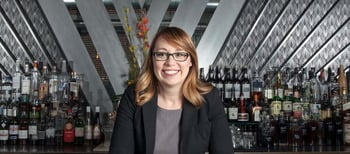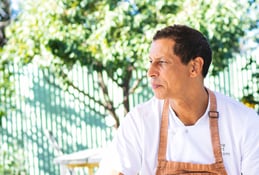Creating a sustainable restaurant means not only exhibiting leadership but also nurturing leadership. This is the philosophy behind Tara Monsod’s illustrious tenure as the head chef for San Diego’s ANIMAE. It’s also proving an intuitive model for building a kitchen mentorship program for restaurants of every style and niche.
Restaurant kitchen mentorship program development is a long-term strategy, and one that is often overlooked as operators manage demanding day-to-day challenges like quality control, staff turnover, and kitchen backups. But as Monsod’s experience suggests, restaurant kitchen mentorship program development may actually improve your restaurant’s ability to manage these challenges by giving your team a real stake in both the day-to-day and long term success of the operation.
“I enjoy mentorship," Monsod noted of her own experience. "It comes naturally to me. And I get more satisfaction out of seeing other people do well and knowing that I had a part to play in it, rather than just teaching them how to make one sauce.”
But beyond Monsod’s own enjoyment, her mentorship style stands out because ANIMAE has forged a uniquely familial company culture where staff loyalty is high and turnover is low. These are conditions that most chefs and operators aspire to, so we caught up with Monsod to find out more about her unique experience and how it might be instructive for building a kitchen mentorship program for restaurants of every kind.
A Journey From Mentee to Mentor
It makes sense that Monsod has dedicated herself to mentorship. Her own unlikely journey to ANIMAE’s executive chef role began on the kitchen line. Leaving nursing school for culinary school in her mid-20s, Monsod took her first kitchen job at Tender Greens in San Diego before moving on to work at some of the city’s most prominent restaurants, including Richard Blais’ Juniper and Ivy.
Monsod joined ANIMAE in 2020 as a sous chef but shortly after her arrival, the restaurant was shuttered by the pandemic. When it did ultimately reopen, Monsod was back, this time helming the kitchen. When she made the decision to reinvent the menu with a focus on the Filipino flavors she grew up eating, the one-time Japanese steakhouse garnered fresh attention–both from industry publications like Food and Wine and from Filipino families, who would sometimes drive in from hours away for the authentic cuisine.
“Filipino food is starting to gain traction in the U.S. as a whole, and not just as food you get out of a styrofoam box for $8,” said Monsod. “When I decided I wanted to do it here, I was the third chef [at ANIMAE], and I thought I was going to get yelled at, but word got around that everything was really good, and now I have people from my generation who are so proud to show people like our parents that they can get Filipino food served in a nice dining room with a glass of wine.”
Monsod’s bold decision has been rewarded with increased visibility for her restaurant and her own rising notoriety in the industry. She has seized the opportunity to pass along both her courage and her creativity to her team.
8 Tips for Building a Kitchen Mentorship Program for Restaurants
Stepping into her first executive chef position, Monsod set out to create the kind of environment she longed for as a young chef. She wanted her team members to be able to ask questions without hesitation. She encouraged staff to test out their own ideas. And she’s coaching her chefs so that one day, they can step into leadership opportunities of their own.
She’s also cultivated the kind of restaurant culture that keeps turnover low, morale high, and quality well under control. Monsod provided us with tips you can apply to restaurant kitchen mentorship program development in your own operation.
1. Break down the wall between front and back of house
“There’s this whole front of house, back of house separation. It never made sense to me. So my goal is to try to break that,” explained Monsod. “We’re one team, and everyone’s dependent on each other, so there’s no reason why you shouldn’t ask questions, and I encourage my chefs to ask, 'why?'”
By creating more fluidity between the kitchen and the dining floor, Monsod not only fostered more coordinated service but also a greater mutual appreciation for the essential roles fulfilled by all team members. This appreciation is vital for those who aspire to someday provide leadership to both front and back of house personnel.
2. Encourage creativity
Building a kitchen mentorship program for restaurants means providing a space for your chefs to be creative and inviting them to walk into it.
“If they want to be creative, I give them a platform," Monsod said. "It’s their job to conceptualize the dish. I’m not going to tell or force you to do it. But I encourage them, and three or four of my cooks have had something on the menu for a good amount of time, not just as a special. I wish I had that opportunity as a cook.”
3. Give your chefs a chance to shine
Of course, it’s not enough to simply allow your chefs to contribute to the menu. Building a kitchen mentorship program for restaurants also means letting them feel the glow of the spotlight.
“I give them credit. I let the front of house know, ‘Cheyenne made this dish. We collaborated on it with one of the other chefs.’ I always tell them, collaboration is key,” said Monsod.
4. Engage fully in the training process
Effective mentorship also means you can’t sugarcoat the process. Monsod describes the importance of working closely with aspiring chefs on everything from perfecting recipes, to replicating them, to understanding how each selected ingredient impacts the bottom line.
“They need to understand how much work it takes if you want to properly run a restaurant," explained Monsod. "In the end you have to make money. So I talk them through it: ‘If you do a dish, how are you going to replicate it 300 or 400 times?’; ‘How do I make it an easy execution for you, as a cook on this line?’ And then we streamline it. We build the dish together, and then I say, ‘Now you have to cost it.’”
Restaurant kitchen mentorship program development is about more than simply learning how to cook delicious food. As Monsod noted, “it’s a lot of steps, but you need to do it so you know what to sell for. It’s not just putting stuff on the menu.”
5. Take care of your people
Restaurant kitchen mentorship program development starts with a positive working environment.
“My turnover is very low," she said. "I feel like my team is very loyal to me. I put a love into my team.”
For example, she explains that “if you’re working your butt off in a heat wave of 110 [degrees], we buy them cases and cases of Gatorade and a crapload of fans. It’s taking those extra steps to show they’re not just sweating away their value. I felt that way sometimes as a cook. I try to do little things to show appreciation and build culture. I think I've built a culture where we’re a family and everyone takes care of each other.”
6. Invest the time in your team
Building a kitchen mentorship program for restaurants can be a lot of extra work, points out Monsod.
“It takes sacrifice, I’m not going to lie. I’m away from my wife for 12 or 14 hours of the day. But she also doesn’t know any different. It takes a special breed of people to understand what it’s like to work like this. It gets to the point where my team is like, ‘Chef go home.’”
But ultimately, Monsod believes that her team’s success and happiness is well worth the sacrifice.
“I’m the type of person that feels like I need to be present for you to see that I’m trying to be a leader and be there for you," she said. "So the last two years, I’ve worked my ass off to get things going, and hopefully bring ANIMAE to a light where it’s more than just about the food. When you speak about us, it’s about, ‘The servers, the cooks, they say they’re really happy working there.’”
7. Lead by example
Effective restaurant kitchen mentorship program development requires a mentor who is active, engaged, and inspiring. Simply stated, your mentees need to see that you are working at least as hard as they are.
“It gets to the point when you’re a line cook and you see your chef not running around, not physically on the line, and you ask yourself, ‘What do they do?’ I thought that myself when I was younger. So I like to show them, this is what I’m doing, and if you want to get to a position like mine, this is what to expect. You’re in charge of everything under this roof.”
Let your team see how hard you’ve worked to get where you are. This is perhaps the best way for those with big ambitions to understand what will be required of them if they wish to do the same.
8. Make yourself visible
In addition to making yourself visible to your team members, you should be just as visible to the diners who visit your restaurants.
“I’ve learned a lot just talking to guests," Monsod explained. "My cooks see me roaming the room, and they know not all chefs do that, but I’m trying to be different. There’s no reason why there’s one way of doing things anymore. So they see that and the importance of talking to people. You can’t be in a cave the entire time. And that leads to people saying, ‘Your staff seems really happy.’”
After all, as Monsod herself has observed, "happy chefs lead to good food.”
Build a Team of Happy Chefs Using Smarter Technology
This is a great nugget of wisdom when it comes to building a kitchen mentorship program for restaurants. But it also underscores the importance of making smart and well-informed hiring decisions.
In an increasingly competitive staffing environment, it can help to leverage some of the leading edge recruiting and hiring technology available on the market today. Check out our index of the industry’s top vendors and start your search today!





